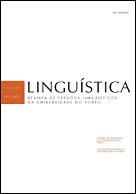É um não querer mais que bem querer Gramaticalização de conceitos volitivos
Resumo
O presente estudo concentra-se na gramaticalização do verbo querer que leva ao surgimento de quatro categorias gramaticais: os valores futuro, proximativo, iminencial inconcluso e concessivo. O objetivo principal é expor a lógica subjacente às mudanças que geraram os quatro valores. Verificar-se-á que, de modo geral, a lógica em causa é idêntica em todos os casos, o que sugere que os valores aqui discutidos formam um conjunto de categorias gramaticais relacionadas. O denominador comum partilhado pelos valores é um resultado da persistência (Hopper 1991) que o preservou como vestígio do conteúdo original do verbo querer.
Referências
Aijmer, Karin. 1985. The semantic development of will. In: Jacek Fisiak (Ed.). Historical semantics, historical word formation. Berlin: Mouton de Gruyter, 11-21.
Ameka, Felix. 1990. The grammatical packaging of experiences in Ewe: A study in the semantics of syntax. Australian Journal of Linguistics 10: 139-181.
Bonvini, Emilio. 2008. About “Eating” in a few Niger-Congo languages. In: Martine Vanhove (Ed.). From Polysemy to Semantic Change. Amsterdam: John Benjamins, 267-290. Boryś, Wiesław. 2005. Słownik etymologiczny języka polskiego. Kraków: Wydawnictwo Literackie.
Bybee, Joan. 2015. Language Change. Cambridge: Cambridge University Press. Carvalho, Maria José. 2012. A Gramaticalização e a lexicalização como processos históricos. Estudos Linguísticos/Linguistic Studies 6-7: 159-176.
Condillac, Étienne Bonnot de. 1746. Essai sur l’origine des connaissances humaines. Paris: Ch. Houel, Imprimeur.
Halász, Elöd. 1973. Handwörterbuch der ungarischen und deutschenSprache. Vol. 1: Ungarisch-Deutsch. Berlin: Langenscheidt.
Hansen, Maj-Britt Mosegaard. 2008. Particles at the Semantics/Pragmatics Interface: Synchronic and Diachronic Issues, a Study with Special Reference to the French Phasal Adverbs. Amsterdam: Elsevier.
Heine, Bernd. 1992. Grammaticalization chains. Studies in Language 16 (2): 335-368. Heine, Bernd. 1996. Grammaticalization and language universals. Faits de langues. 4(7): 11-22.
Heine, Bernd. 1999. The Ani: Grammatical notes and texts. Institut für Afrikanistik, Universität zu Köln. Khoisan Forum (Cologne) 11.
Heine, Bernd & Kuteva, Tania. 2002. World Lexicon of Grammaticalization. Cambridge: Cambridge University Press.
Hoeksema, Jack. 2013. Immediate-future readings of universal quantifier constructions. In: Ritsuko Kikusawa & Lawrence A. Reid (Eds.). Historical Linguistics 2011: Selected papers from the 20th International Conference on Historical Linguistics, Osaka, 25-30 July 2011. Amsterdam: John Benjamins Publishing Company, 227-241.
Hopper, Paul J. 1991. On some principles of grammaticization. In: Elizabeth Gloss Trau- gott & Bernd Heine (Eds.). Approaches to grammaticalization, Vol. I. Amsterdam: John Benjamins, 17-35.
Hopper, Paul J. & Traugott, Elizabeth Closs. 1993. Grammaticalization. Cambridge: Cambridge University Press.
Klemensiewicz, Zenon; Urbańczyk, Stanisław & Lehr-Spławiński, Tadeusz. 1964. Gramatyka historyczna języka polskiego. Warszawa: Wydawnictwo Naukowe PWN.
Li, Charles N. & Thompson, Sandra A. 1981. Mandarin Chinese: A functional reference grammar. Berkeley, LA: University of California Press.
Lima, José Pinto de. 1997. Caminhos semântico-pragmáticos da gramaticalização: o caso de embora. In: A.M. Brito et al. (Eds.). Sentido que a Vida Faz. Estudos para Óscar Lopes. Porto: Campo das Letras, 643-655.
Lima, José Pinto de. 2001. Sobre a génese e a evolução do futuro com ir em português. In: Augusto Soares Silva (Ed.) Linguagem e Cognição. A Perspectiva da Linguística Cognitiva. Braga: Associação Portuguesa de Linguística / Universidade Católica Portuguesa, 119-145.
Leuschner, Torsten. 2008. From speech-situation evocation to hypotaxis: The case of Latin quamvis ‘although’. In: Elena Seoane & María José López-Couso (Eds.). Theoretical and Empirical Issues in Grammaticalization. Amsterdam: John Benjamins, 231-252.
Meillet, Antoine. 1912. L’évolution des formes grammaticales. Scientia (Rivista di Scienza) 12(26, 6): 130-148.
Poulos, George. 1990. A linguistic analysis of Venda. Pretoria: Via Afrika.
Raposo, Eduardo P. 1992. Teoria da gramática: a faculdade da linguagem. Lisboa: Caminho. Romaine, Suzanne. 1999. The grammaticalization of the proximative in Tok Pisin. Language 75: 322-46.
Silva, Augusto Soares da. 2006. O Mundo dos Sentidos em Português: Polissemia, Semântica e Cognição. Coimbra: Almedina.
Sławski, Franciszek. 1982. Słownik etymologiczny języka polskiego, Kraków: Towarzystwo Miłośników Języka Polskiego.
Szcześniak, Konrad. 2013. You can’t cry your way to candy: Motion events and paths in the x’s way construction. Cognitive Linguistics 24(1), 159-194.
Touratier, Christian. 1994. Syntaxe latine. Louvain-la-Neuve: Peeters.
Tsangalidis, Anastasios. 1999. Will and Tha: A Comparative Study of the Category Future. Thessaloniki: University Studio Press.
Downloads
Publicado
Edição
Secção
Licença
Direitos de Autor (c) 2018 Linguística Revista de Estudos Linguísticos da Universidade do Porto

Este trabalho encontra-se publicado com a Creative Commons Atribuição-NãoComercial 4.0.



